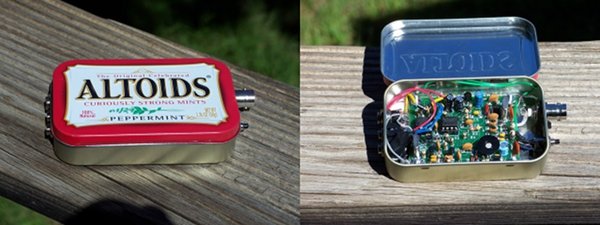The Rockmite: A 40 meters CW QRP Rig (in an Altoids Tin)
Computers dominate most of my time. Â My job keeps me tapping on the keyboard most days, and my love of learning about new technologies (and administering my many Gentoo Linux machines) keeps me tapping away most nights. Â Sometimes I need another outlet, which is why over the last few years I have become more active with my amateur radio hobby -- a.k.a. ham radio.
Although wireless communications are now commonplace, there is a certain mystique in pulling signals out of the air that most people don't even know are there. Â The shortwave (HF), VHF, and UHF radio bands are full of interesting programs, conversation, and mysterious bloops. Â In my quest to contribute as many bloops on the air as possible, I recently purchased a nice radio kit called The Rockmite.
The Rockmite is a low power (QRP) shortwave transceiver (combination receiver and transmitter) that can send morse code (CW) on a variety of frequencies. Â I built the 7.030 MHz model, which operates on the 40 meters ham radio band. Â It has a maximum output of 0.5 watts, which may sound wimpy to most, but on shortwave frequencies such a rig is capable of sending signals around the world. Â In fact, the distance record for the Rockmite is a ham in Tennessee communicating with someone in New Zealand! Â Yes, I can call anyone in NZ for free on Skype wirelessly on my iPhone, but that's not the point -- it's the mystique and satisfaction that a few diodes, some wire, and a few hours to solder it together can create a useful communications tool.
Amateur radio is probably one of the few technical hobbies that still exist. Â The community reminds me of the old days (late 80's) computer fair scene, before AOL plastered the world with their free demo CD-ROM's.
Here are a couple pictures of my new radio, mounted nicely in an Altoids tin. Â Now I just need to brush up on my morse code!
Posted: Sep 15, 2010
Keyword tags: ham radioshortwave radioamateur radiorockmitetransceiverCWaltoidselectronics
Recent Posts:
Popular Posts:
Recent Security Posts:
S3 Buckets: Now With Both Leak & Fill Vulnerability
Stealing Data With CSS: Attack and Defense
Move Over S3: Open Directory Indexes Continue to be a Problem
Security Researchers Lose a Favorite DNS Recon Tool Jan 2018
KRACK: How To Protect Yourself on a Flawed Network
Equifax, SEC, & Now Deloitte: Organizations Must Employ Offensive Security
